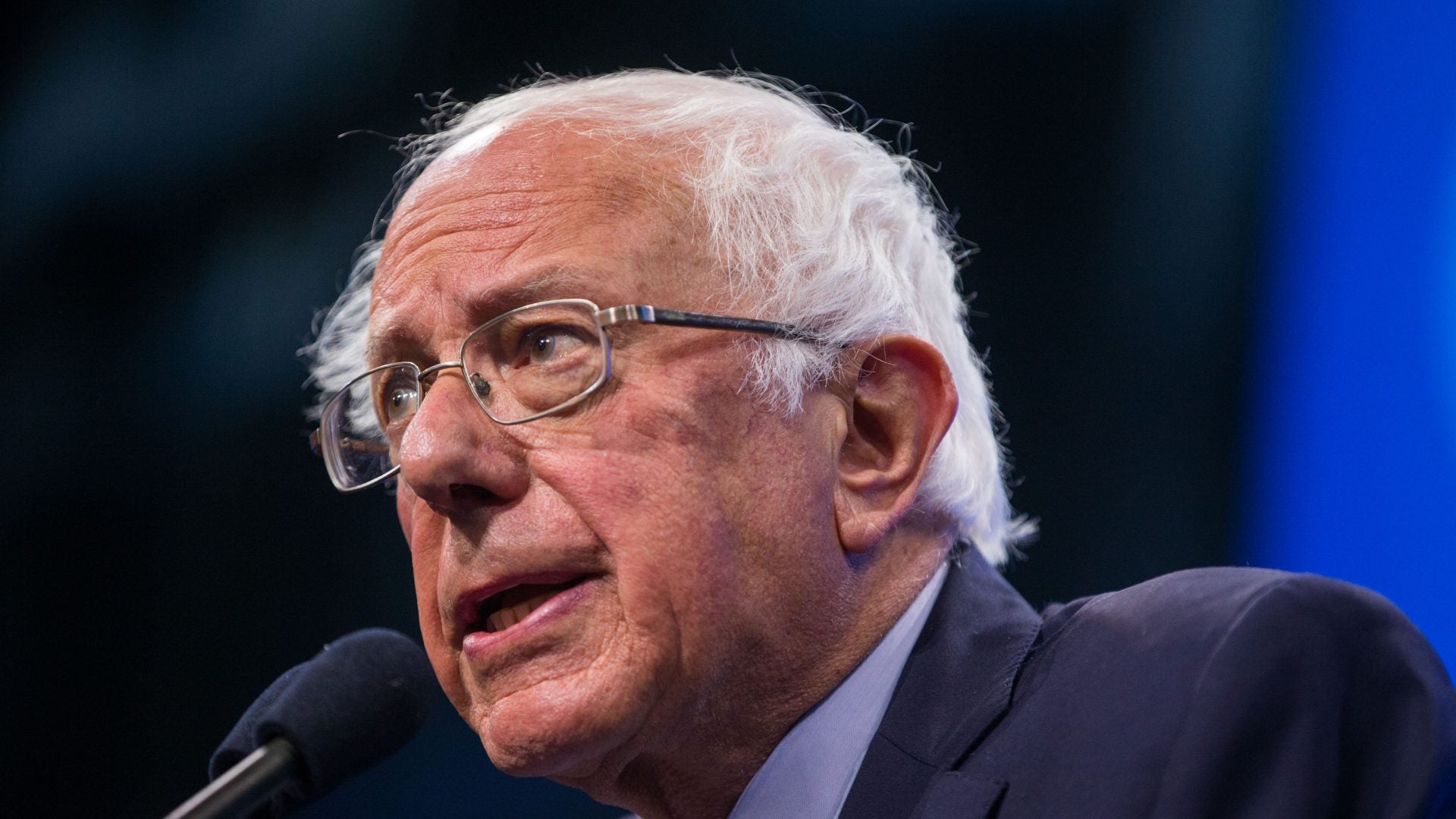
Last month, the Bernie Sanders campaign made its displeasure with the media clear.
“There seems to be a direct correlation between the media’s coverage of polls and Bernie Sanders’s specific standing in those polls,” Jeff Weaver, a Sanders adviser who managed his 2016 presidential bid, reportedly said in a conference call with press members. “The better the number is in the poll, the less coverage he’s received, and the worse he does, the more it receives.” As the Washington Post’s Dave Weigel noted, “Weaver had the receipts.”
A month later, there are still articles with headlines like “Why Bernie is stalled” that once again speak to purported doom for the Sanders campaign citing select polls that don’t hold as much weight as some would have you believe if for no other reason than they need your clicks and views. And in articles like these, they offer unsolicited advice such as Sanders “would do well to position himself more clearly inside the fold of the Democratic Party, let go of some of his resentments, and instruct his surrogates to strike a different tone.”
If Bernie Sanders suddenly sounded like your generic Democrat with a disposition deemed “more pleasant” by the political media class, he wouldn’t be Bernie Sanders. He’d be like the white dude running from Montana who has no chance of winning the nomination or that senator from Colorado who also has no shot at getting the nomination. I know their names, but most Americans don’t, hence the emptiness of this writer’s suggestion.
On an anecdotal level, I saw an elder Black woman – an auntie, if you will – recently rocking a 2016 Bernie Sanders for president tee. I didn’t stop to ask if that was just something she grabbed from her ultra progressive grandson, but either way, given the shape of her wig – too jazzy for church so more fitting for a retirement party or hottest hole in the wall club for elders – I can confirm she wanted to be noticed, thus, a good sign for Bernie Sanders.
Does this mean Bernie Sanders is surging? No, but hell, the same can be said of many of the polls now that are largely centered on name recognition. And if not name recognition, regurgitation — say, cable news pundits repeatedly telling viewers that Joe Biden is the only old white man who can defeat President Trump next year.
So, in many respects, I can understand the issue Bernie Sanders has with corporate media. That said, I assume that unsolicited advice about Team Sanders is rooted in the campaign’s very pointed criticism of the Washington Post specifically.
At his town hall last month in Wolfeboro, N.H., Sanders mentioned that Amazon doesn’t pay taxes which gave way to criticism about coverage of his campaign.
“See, I talk about that all of the time,” Sanders explained. “And then I wonder why The Washington Post — which is owned by Jeff Bezos, who owns Amazon — doesn’t write particularly good articles about me. I don’t know why. But I guess maybe there’s a connection. Maybe we helped raise the minimum wage at Amazon to 15 bucks an hour as well.”Unsurprisingly, many journalists took issue with Sanders’ insinuation.
Martin Baron, The Post’s executive editor, said in a statement: “Sen. Sanders is a member of a large club of politicians — of every ideology — who complain about their coverage. Contrary to the conspiracy theory the senator seems to favor, Jeff Bezos allows our newsroom to operate with full independence, as our reporters and editors can attest.”
Personally, I doubt that Bezos is calling editors to troll Bernie Sanders, but as The Nation’s Jeet Heer noted in “Democracy Dies From Bad Fact-Checking,” he is not totally wrong about his contempt. “The Washington Post has fallen into the habit of accusing Bernie Sanders of misleading the public even in cases where the evidence is strongly on the side of the Vermont senator,” Heer wrote.
I felt similarly to a Washington Post fact checker condemning another presidential candidate, Cory Booker, over his claim about the role voter suppression played in the 2016 presidential election. In that instance, “facts” felt very much presented through the lens of someone with an inherent bias — and it matters not to me whether or not the person is aware of it. As Heer went on to note in his piece, “The Washington Post is doing journalism no service by turning fact-checking, which should be grounded in empirical evidence, into a tool for polemical mudslinging.”
So, while Sanders may or may not have went overboard in his theorizing his unfavorable coverage from that outlet, he is in no way like President Trump, who is reportedly raising money to directly target reporters. A lot of the very people he will go after are the same folks who fail to identify him as the racist, sexist, xenophobic, transphobic, homophobic, serially accused sexual assaulter and burgeoning facists that he is.
All politicians may be guilty of disparaging the press over coverage that they don’t especially care for, but at the heart of Sanders’ gripes is that because of media consolidation and corporate ownership, the coverage has shifted to something increasingly less substantive. It is exactly why for presidential debates, cable news networks televise drawings as if we were watching a sporting event.
Lost in the back and forth coverage of Bernie versus The Press Round 3,457 is that he quietly released a very smart and important plan for journalism by way of an op-ed for CJR.
“One reason we do not have enough real journalism in America right now is because many outlets are being gutted by the same forces of greed that are pillaging our economy,” Sanders writes and he goes on to highlight “two Silicon Valley corporations—Facebook and Google—control 60 percent of the entire digital advertising market.”
Their ability to maintain “monopolistic control to siphon off advertising revenues from news organizations” is why week after week people in media are complaining of layoffs. This issue is further complicated by the reality that “corporate conglomerates and hedge fund vultures have bought and consolidated beleaguered local newspapers and slashed their newsrooms—all while giving executives big payouts.”
And while local TV news is declining, it remains the most trusted form of news among Americans. If you are unfamiliar with the pro-Trump Sinclair Media – the largest owner of local television news – and its penchant for proganda, you should. And then be very afraid as they expand their reach.
Bernie Sanders says he wants to combat this widening consolidation of media in ways such as “requiring major media corporations to disclose whether or not their corporate transactions and merger proposals will involve significant journalism layoffs.” And: “We will also require that, before any future mergers can take place, employees must be given the opportunity to purchase media outlets through employee stock-ownership plans—an innovative business model that was first pioneered in the newspaper industry.”
Not to mention: “We will also direct federal agencies to study the impact of consolidation in print, television, and digital media to determine whether further antitrust action is necessary.”







As for those who work in media: “we will pass my Workplace Democracy Plan, which will boost media workers’ laudable efforts to form unions and collectively bargain with their employers.”
There are a litany of other suggestions made throughout his essay, but ultimately, while I can understand certain complaints about tone and potentially dangerous rhetoric, Bernie Sanders doesn’t hate media so much as he detests how big business has trampled over it, and thanks to current laws, changing it in ways that will permanently soil (combined with the aforementioned reporters who to this day, do not know how to report on Donald Trump). Again, people have the right to huff and puff about some of Bernie Sanders’ media criticism, but he deserves credit for trying to push the industry to be better, and less, far less insufferable.
That doesn’t mean I’m about to throw on a throwback tee like auntie, but I do believe his plan deserves more attention.






